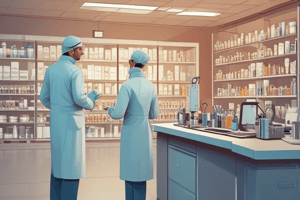Podcast
Questions and Answers
How do high-quality laboratories reduce waste of time and resources?
How do high-quality laboratories reduce waste of time and resources?
They reduce the need for retesting by producing accurate results, thereby saving time and money.
What is the benefit of a laboratory having a reputation for quality?
What is the benefit of a laboratory having a reputation for quality?
It enhances the credibility of their work and increases trust among professionals, patients, and stakeholders.
What promotes a culture of continuous improvement in laboratories?
What promotes a culture of continuous improvement in laboratories?
Quality management systems that encourage regular monitoring, evaluation, and feedback mechanisms.
What is the primary goal of a Quality Management System (QMS)?
What is the primary goal of a Quality Management System (QMS)?
How does a Quality Management System (QMS) ensure quality in a laboratory?
How does a Quality Management System (QMS) ensure quality in a laboratory?
What drives laboratories to stay current with evolving technologies and methodologies?
What drives laboratories to stay current with evolving technologies and methodologies?
What is the significance of regulatory standards in laboratories?
What is the significance of regulatory standards in laboratories?
What is the role of laboratories in public health issues?
What is the role of laboratories in public health issues?
Why is quality control important in industry?
Why is quality control important in industry?
What is the significance of reproducibility in scientific studies?
What is the significance of reproducibility in scientific studies?
What is the importance of Good Laboratory Practices?
What is the importance of Good Laboratory Practices?
What was the claim of Theranos, a biotech company?
What was the claim of Theranos, a biotech company?
What is the purpose of laboratory manuals and protocols?
What is the purpose of laboratory manuals and protocols?
Why is quality testing essential in laboratories?
Why is quality testing essential in laboratories?
What is the purpose of quality planning in a Quality Management System?
What is the purpose of quality planning in a Quality Management System?
What is the focus of quality control in a Quality Management System?
What is the focus of quality control in a Quality Management System?
What is the proactive approach of quality assurance in a Quality Management System?
What is the proactive approach of quality assurance in a Quality Management System?
What is the purpose of quality improvement in a Quality Management System?
What is the purpose of quality improvement in a Quality Management System?
What are some examples of activities involved in quality control?
What are some examples of activities involved in quality control?
What type of quality management system is specified in the ISO 13485 standard?
What type of quality management system is specified in the ISO 13485 standard?
What is the purpose of auditing in a Quality Management System?
What is the purpose of auditing in a Quality Management System?
What is the relationship between ISO 9001:2015 and other ISO QMS standards?
What is the relationship between ISO 9001:2015 and other ISO QMS standards?
Flashcards are hidden until you start studying
Study Notes
Cost Efficiency
- High-quality laboratories reduce retesting, saving time and money
- Accurate results minimize errors, improving cost efficiency
Trust and Credibility
- Trust is essential in scientific and medical communities
- Laboratories with a reputation for quality earn trust from professionals, patients, and stakeholders
- This credibility enhances the laboratory's work
Continuous Improvement
- Quality management systems encourage a culture of continuous improvement
- Regular monitoring, evaluation, and feedback identify areas for enhancement
- This helps laboratories stay current with evolving technologies and methodologies
Quality Management System (QMS)
- A QMS is a framework for managing and improving an organization's quality
- It consists of policies, processes, procedures, and resources to consistently meet or exceed customer expectations
- Example: Theranos, a biotech company, lacked a proper QMS, leading to misled investors and patients
Regulatory Compliance
- Laboratories must adhere to regulatory standards and guidelines
- Adherence ensures consistent and reliable testing and experimentation
- Regulatory bodies set these standards
Control Public Health
- Laboratories monitor and control public health issues, such as infectious diseases and environmental contaminants
- Quality testing is essential for early detection, containment, and mitigation of health threats
- Laboratory safety and infectious disease sample handling are crucial
Decision-Making in Industry
- Laboratory quality is critical for quality control and assurance in manufacturing and industry
- Consistent and accurate testing maintains product quality, ensures compliance with industry standards, and supports decision-making in production processes
Data Reproducibility
- Scientific studies require reproducibility to validate findings
- Good Laboratory Practices (GLP) contribute to reproducibility, allowing other researchers to verify and build upon existing knowledge
- GLP includes Laboratory Manuals, Protocols, and Record Keeping
ISO 9001:2015 and Other QMS Standards
- ISO 9001:2015 is the most recognized quality management system standard in the world
- Other ISO QMS standards include ISO 14000 series, ISO 13485, ISO 19011, and IATF 16949
Elements and Requirements of QMS
- Quality Planning: establishing quality objectives and determining necessary processes
- Quality Control: monitoring and verifying that products or services meet specified requirements
- Quality Assurance: proactive approach to preventing issues before they occur
- Quality Improvement: using data and feedback to continuously enhance processes and systems
Studying That Suits You
Use AI to generate personalized quizzes and flashcards to suit your learning preferences.




